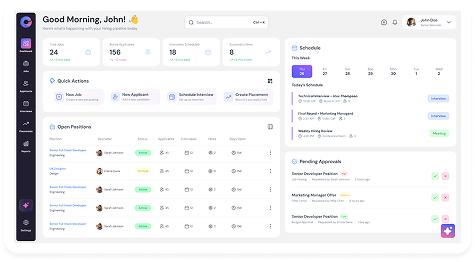Equal Employment Opportunity
Affirmative Action: Specific steps taken to actively recruit and promote qualified members of protected groups who may have been excluded from equal employment opportunities in the past.
Age Discrimination: Unlawful to discriminate against a candidate or employee based on age (40 or older in the US).
Applicant Tracking System (ATS): Software that helps manage the recruitment process, including storing resumes, screening applicants, and tracking their progress. Some ATS features may use AI to automate certain aspects of EEO compliance, but they should not be solely relied upon.
Disparate Impact: A neutral policy or practice that has a disproportionate negative effect on a protected group. Even if an employer has no discriminatory intent, it may be held liable if a policy has a disparate impact.
EEO Officer: An individual within an organization who is responsible for overseeing EEO compliance and ensuring fair treatment of all applicants and employees.
EEOC (Equal Employment Opportunity Commission): A federal agency that enforces laws prohibiting discrimination in employment based on race, color, religion, sex (including pregnancy), national origin, age (40 or older), disability, or genetic information (US). Similar organizations exist in other countries.
Equal Opportunity: The principle that all individuals have the right to be considered for employment based on their qualifications, without regard to certain protected characteristics.
Job Description: A written document outlining the duties, responsibilities, and qualifications required for a specific position. Job descriptions should be written in a way that is inclusive and avoids language that could be perceived as discriminatory.
National Origin Discrimination: Unlawful to discriminate against a candidate or employee based on their country of origin, ethnicity, or ancestry.
Protected Class/Group: A category of individuals who are protected from discrimination under EEO laws. Protected classes typically include race, color, religion, sex (including pregnancy), national origin, age (40 or older), disability, or genetic information.
Reasonable Accommodation: A modification or adjustment to a job or work environment that allows a qualified candidate or employee with a disability to perform the essential functions of the job.
Religious Accommodation: An employer is required to make reasonable accommodations for an employee’s sincerely held religious beliefs, unless it would cause undue hardship to the employer.
Resume/CV: A document that outlines a candidate’s education, work experience, skills, and accomplishments.
Sex Discrimination: Unlawful to discriminate against a candidate or employee based on their sex, including pregnancy, sexual orientation, or gender identity.
Unconscious Bias: Implicit stereotypes that can influence our decisions without our conscious awareness. Unconscious bias can lead to discrimination in the recruitment process.
Shortlist: A list of candidates who have been identified as the most qualified for a particular position and are invited to interview.
Work Authorization: Legal permission to work in a particular country.

